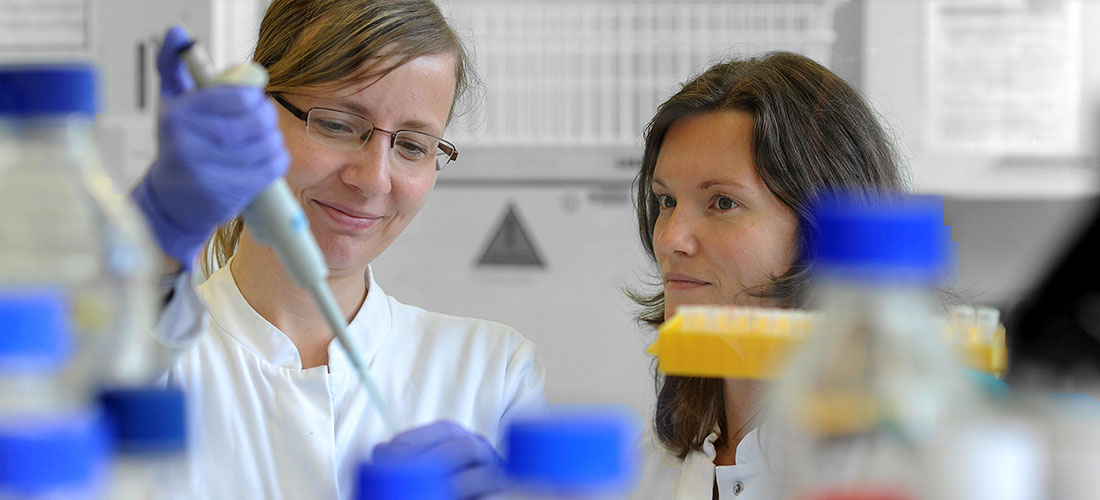Prof. Dr. rer. nat. Christine Sers

Research Group Molecular Tumor Pathology
Institute of Pathology
Charité - Universitätsmedizin Berlin
Charitéplatz 1
10117 Berlin
Tel: +49 30 450 536 185
E-Mail: christine.sers(at)charite.de
https://pathologie-ccm.charite.de/en/research/research_groups/research_group_sers_molecular_tumor_pathology/
University Education
- 1988 Diploma in genetics and immunology, Universität München
- 1992 Ph.D., Institute of Immunology, Universität München
- 2002 Habilitation
Professional Experience (selection)
- 1991 Visiting scientist, Institute of Biochemistry, University Njimegen, Netherlands
- 1992 Postdoctoral Scientist, Institute of Immunology; University Munich, Germany
- 1993-1996 Postdoctoral Scientist, Institute of Pathology; University Zürich; Switzerland
- 1996-1998 Postdoctoral Scientist, Institute of Pathology, Charité, Germany
- 1998 Visiting scientist, Institute of Biochemistry, University Njimegen, Netherlands
- Since 1998 Group leader Institute of Pathology, Charité, Germany
- 2012 Professor for Tumor Systemsbiology, Charité, Germany
Research Fields
- i) Cancer Research
- ii) Signal Transduction
- iii) Systems Biology
Scientific Scope
Current research of the group focuses on systems-oriented tumor biology, particularly on signal transduction systems in cancer cells. The objectives of research projects are aiming at a detailed understanding of the organization, regulation and biological features of oncogenic signaling in order to integrate basic cancer research, molecular tumor diagnostics and predictive oncology. The group has widespread collaboration within Germany and worldwide. Currently funded research projects include the EU MESI-Strat project on breast cancer (https://mesi-strat.eu/), the Oncologics Project, an new EU consortium dedicated to improve personalized therapy in colorectal cancer and the Einstein Visiting fellow program focusing on RAS oncogene transformed pancreatic and colorectal cancer.
Group Members
Most important Awards, Grants or Scientific Achievements
- 2007-2008 NGFN2 Infection and Inflammation Network SIPAGE
- 2002005-2013 CRC SFB 618
- 2009-2012 BMBF ColoNET
- 2013-2015 BMBF eBIO Oncopath
- 2012-2016 BMBF DKTK (Molecular Diagnostics of colorectal cancer)
Selected References
- Mamlouk S, Simon T, Tomás L, Wedge DC, Arnold A, Menne A, Horst D, Capper D, Morkel M, Posada D, Sers C, Bläker H. Malignant transformation and genetic alterations are uncoupled in early colorectal cancer progression. BMC Biol. 2020 Sep 7;18(1):116. doi: 10.1186/s12915-020-00844-x.
- Klotz-Noack K, Klinger B, Rivera M, Bublitz N, Uhlitz F, Riemer P, Lüthen M, Sell T, Kasack K, Gastl B, Ispasanie SSS, Simon T, Janssen N, Schwab M, Zuber J, Horst D, Blüthgen N, Schäfer R, Morkel M, Sers C. SFPQ Depletion Is Synthetically Lethal with BRAFV600E in Colorectal Cancer Cells. Cell Rep. 2020 Sep 22;32(12):108184. doi: 10.1016/j.celrep.2020.108184.
- Ozkan-Dagliyan I, Diehl JN, George SD, Schaefer A, Papke B, Klotz-Noack K, Waters AM, Goodwin CM, Gautam P, Pierobon M, Peng S, Gilbert TSK, Lin KH, Dagliyan O, Wennerberg K, Petricoin EF 3rd, Tran NL, Bhagwat SV, Tiu RV, Peng SB, Herring LE, Graves LM, Sers C, Wood KC, Cox AD, Der CJ. Low-Dose Vertical Inhibition of the RAF-MEK-ERK Cascade Causes Apoptotic Death of KRAS Mutant Cancers. Cell Rep. 2020 Jun 16;31(11):107764. doi: 10.1016/j.celrep.2020.107764.
- Gastl B, Klotz-Noack K, Klinger B, Ispasanie S, Salib KHF, Zuber J, Mamlouk S, Bublitz N, Blüthgen N, Horst D, Morkel M, Schäfer R, Sers C. Reduced replication origin licensing selectively kills KRAS-mutant colorectal cancer cells via mitotic catastrophe. Cell Death Dis. 2020 Jul 1;11(7):499. doi: 10.1038/s41419-020-2704-9.
- Heberle AM, Razquin Navas P, Langelaar-Makkinje M, Kasack K, Sadik A, Faessler E, Hahn U, Marx-Stoelting P, Opitz CA, Sers C, Heiland I, Schäuble S, Thedieck K. The PI3K and MAPK/p38 pathways control stress granule assembly in a hierarchical manner. Life Sci Alliance. 2019 Mar 28;2(2):e201800257. doi: 10.26508/lsa.201800257.
- Brandt R, Sell T, Lüthen M, Uhlitz F, Klinger B, Riemer P, Giesecke-Thiel C, Schulze S, El-Shimy IA, Kunkel D, Fauler B, Mielke T, Mages N, Herrmann BG, Sers C, Blüthgen N, Morkel M. Cell type-dependent differential activation of ERK by oncogenic KRAS in colon cancer and intestinal epithelium. Nat Commun. 2019 Jul 2;10(1):2919. doi: 10.1038/s41467-019-10954-y. PMID: 31266962; PMCID: PMC6606648.
- Bormann F, Stinzing S, Tierling S, Morkel M, Markelova MR, Walter J, Weichert W, Roßner F, Kuhn N, Perner J, Dietz J, Ispasanie S, Dietel M, Schäfer R, Heinemann V, Sers C. Epigenetic regulation of Amphiregulin and Epiregulin in colorectal cancer. Int J Cancer. 2019 Feb 1;144(3):569-581. doi: 10.1002/ijc.31892. Epub 2018 Nov 7. PMID: 30252132.
- Fritsche-Guenther R, Zasada C, Mastrobuoni G, Royla N, Rainer R, Roßner F, Pietzke M, Klipp E, Sers C, Kempa S. Alterations of mTOR signaling impact metabolic stress resistance in colorectal carcinomas with BRAF and KRAS mutations. Sci Rep. 2018 Jun 15;8(1):9204. doi: 10.1038/s41598-018-27394-1. PMID: 29907857; PMCID: PMC6003911.
- Mamlouk S, Childs LH, Aust D, Heim D, Melching F, Oliveira C, Wolf T, Durek P, Schumacher D, Bläker H, von Winterfeld M, Gastl B, Möhr K, Menne A, Zeugner S, Redmer T, Lenze D, Tierling S, Möbs M, Weichert W, Folprecht G, Blanc E, Beule D, Schäfer R, Morkel M, Klauschen F, Leser U, Sers C. DNA copy number changes define spatial patterns of heterogeneity in colorectal cancer. Nat Commun. 2017 Jan 25;8:14093. doi: 10.1038/ncomms14093.
- Riemer P, Rydenfelt M, Marks M, van Eunen K, Thedieck K, Herrmann BG, Blüthgen N, Sers C, Morkel M. Oncogenic β-catenin and PIK3CA instruct network states and cancer phenotypes in intestinal organoids. J Cell Biol. 2017 Jun 5;216(6):1567-1577. doi: 10.1083/jcb.201610058. Epub 2017 Apr 25. PMID: 28442534; PMCID: PMC5461020.



